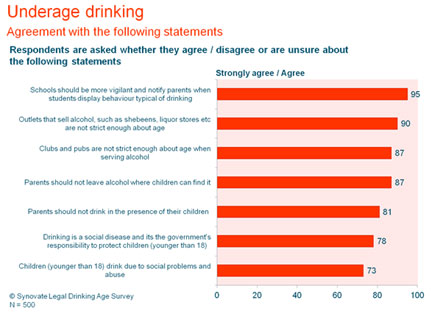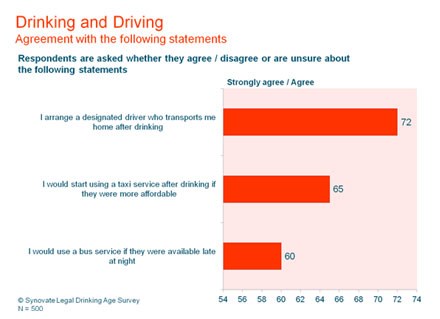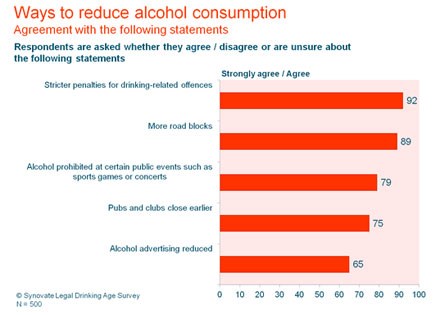
Two-thirds of South Africans support increasing the legal drinking age to 21
Synovate conducted the survey in response to the proposal by Social Development Minister, Bathabile Dlamini in March 2011. Alcohol ranks third in the country's burden of disease and disability.
These results are based on Synovate's poll of 500 respondents in Johannesburg, Pretoria and Cape Town. The survey was conducted using an intercept face-to-face methodology.
"The results of the survey demonstrate public concern around alcohol abuse and support for governments' current and proposed actions against it," states Jake Orpen, Managing Director at Synovate.
Response to the proposal
Of the 500 respondents interviewed, 56% had heard about the proposal with 44% unaware that the legal drinking age was being reconsidered. Two-thirds believe that the proposal will decrease both alcohol abuse and underage drinking. The majority of respondents also believe that drunken driving and violent behaviour / domestic abuse could also be reduced if the law is passed (64% and 62% respectively).
Interestingly, those aged between 21 and 24 years of age were most confident that the proposed law would cut down on underage drinking in South Africa, whilst respondents aged between 18 and 20 were least convinced.
Underage drinking is a problem
Nine out of ten respondents agree that underage drinking is a problem in our country, with only 9% disagreeing. This perception is present across all age groups. 61% percent claim to have been exposed to underage drinking, with the greatest exposure coming from the older age groups, i.e. 25 - 34 and 50 years and over.
In the effort to combat underage drinking, 95% believe that schools should be more vigilant and notify parents when students display behaviour indicative of drinking. Looking at parents' drinking behaviour, 87% believe that parents should not leave alcohol where children can find it and 81% of South Africans are of the opinion that parents should not drink in the presence of their children. 78% of respondents maintain that it's government's responsibility to protect children from this social disease.

How much do South Africans drink?
A positive result arising from the survey is that one third of respondents surveyed indicated that they do not drink at all, states Orpen.
Seventeen percent stated they drink 2 - 3 times per week and 16% reported that they drink once a week. On average, males are much more frequent drinkers than females.
Of those who do drink, the average number of drinks per occasion is 5. "This is quite a high number when you compare it to the legal limit of 0.05 when driving which is 1 or 2 drinks," states Orpen.
A third of respondents drink between 3 and 4 drinks one each occasion and 27% state that they drink 5-6 drinks per occasion.
Drinking and Driving
Undoubtedly, a significant problem in South Africa is that of drinking and driving. Alcohol has been cited as a factor in 29% of driver injuries and more than 47% of driver deaths .
34% of respondents indicated that they or their friends had driven drunk before and with the same percentage stating that they / their friends do not believe that drinking impairs one's ability to drive. 7% of respondents have been breathalysed after having one or more drinks.
"Obviously this is of grave concern to the South African public and it is clear that this is a priority amongst the traffic authorities judging from their heavy presence on the roads in recent months" states Orpen.
While a significant proportion of South Africans admit to have driven drunk before, it is reassuring to note that they do consider alternative solutions with regards to driving and drinking. 72% of those surveyed state that they organise a designated driver to transport them home after drinking. 65% state that they would use a taxi service after drinking if they were more affordable and 60% state that they would use buses if they were available late at night.

War against alcohol abuse
In the war against alcohol abuse, drunken driving and underage drinking, 92% of respondents believe that more serious consequences / stricter penalties would have a greater effect than banning advertising or prohibiting alcohol at sports matches or concerts.
Consequences such as stricter penalties for drinking-related offences and increased roadblocks were popular with 92% and 89% of respondents respectively. Banning of alcohol advertising was favoured by 65% of those polled.

About Synovate
Synovate, the market research arm of Aegis Group plc, generates insights to help clients drive competitive brand, product and customer experience strategies. A truly borderless company with offices in over 60 countries, our approach combines best in class global research capabilities with personalised service, local knowledge and the flexibility to create teams and processes that meet clients' specific requirements. At Synovate, our clients sit at the top of our organisational chart, driving us to continually develop more innovative research solutions that predict actual business outcomes.
More information on Synovate can be found at www.synovate.com and www.synovate.com/southafrica.

- Unlocking the value of creativity in advertising: How to bridge the creativity gap15 Apr 13:47
- 4 habits keeping your brand poor26 Mar 16:08
- Understanding consumer mindsets for growth in 202407 Mar 08:52
- South Africa's unemployment nightmare: The burden on its people09 May 10:05
- Global survey shows shrinking trust in internet29 Nov 10:17

















